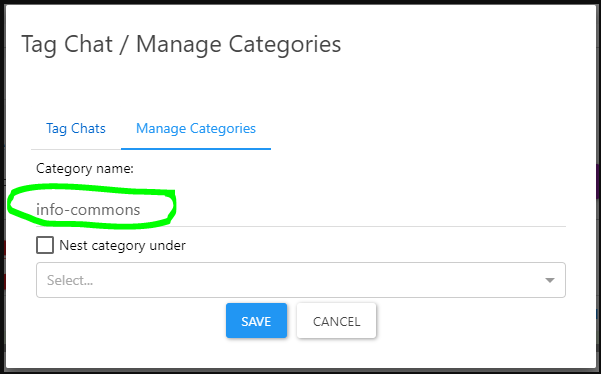Want to build your own 24/7 FAQ knowledge base?
LibraryH3lp subscriptions
include unlimited independent internal or public-facing
knowledge bases.
Search the LibraryH3lp Knowledge Base
How do I tag chats with categories?
4476 views | Last updated on Apr 04, 2025 categories follow-up tag
By default, all LibraryH3lp accounts start with one kind of tag available for chats: Tag for Followup. Optionally, full administrators can add additional categories to their account, so that chats can be tagged using descriptive categories, which paves the way for all kinds of later analysis. The ability to create and manage categories is not available to mini-admins who have restricted privileges over a sub-portion of the subscription.
Here is the basic lay of the land:
- Before there are any custom categories defined, tagging chats for later follow-up will continue to function as usual, with the tagged chat and an optional operator note sent to the email address specified for the chat queue in the dashboard.
- Administrators can create categories with which operators can tag chats.
- Administrators can set things up so that operators are reminded to categorize the chats when they close the chat in the webclient.
Setting up and managing categories (full administrators only)
Administrators can create, edit, and delete categories in the dashboard's Chat History page or in the webclient for staffing. The management functions appear in the "Manage Categories" in the tagging dialog.
![]()

Tags can use space characters and capital letters. However, the chat history search interface is case-sensitive for tag-searches, so it is often best to stick to all lower-case letters.
Nesting
Categories can optionally be nested within other categories to build structure into your meta-analysis and/or to help organize categories when multiple departments might share the same account.

Reminders for operators to tag with categories
Administrators can also optionally enable a reminder to all operators to tag chats when the operator ends the chat in the webclient.

Tagging chats with categories (any operator)
Once an account admin has created at least one category, operators can categorize chats anywhere they have been able to use the original tag for follow-up option. This means categories are available for operators to use in:
- the webclient for staffing in active chats;
- the webclient or dashboard, in the Chat History area;
- the chat management page used by those folks who staff in a separate software client like Pidgin or Adium.
When any of those "tag chat" buttons are used and if there are categories defined, operators will get a chance to tag the chat with one or more categories, plus follow-up if desired.
Show me my tags
The tags for each chat will show up in the Tags column of the Chat History table. If the Tags column is hidden (which was the old default since not everyone uses tag for follow-up) and any of the chats displayed in the table have tags, you'll be asked if you'd like to reveal the Tags column in the table.
Search by tags
Tags and categories are incorporated into our powerful Chat History search interface. You can use the Advanced search form to create your search, or you can use the simple field labels and type the search out, power searcher style.
Here are some example searches:
range:week tag:follow-up
Find chats over the last week tagged "follow-up".
tag:(follow-up,access) range:year
Find chats over the last year tagged either follow-up or access.
And you can combine other fields, use wildcards where supported, and use negation.
tag:*a* queue:*lib* from:2019-02-11 to:2019-03-31 queue:!*arch* operator:ref*
Find chats over that date range where there is a tag including the letter "a" by operators where the username starts with "ref" on queues including "lib" anywhere in the name, but excluding queues with "arch" anywhere in the name.
Note: tags are case-sensitive for searching.
Categorizing in bulk
Chat History has a special button above the table for tagging multiple selected chats simultaneously. For example, you might use transcript keyword search to locate a group of chats and then tag them all at once.
The bulk tagging dialog is a bit fancier if multiple chats are getting tagged because in such situations users will need to specify which tags are to be added to the selected chats and which tags should be removed from the selected chats (if a selected chat happens to have that tag).

Download to CSV file
Chat History has a button above the table for downloading your chat data metadata to a CSV file. Note that by default, tags are not included, but you can add the TAGS column to the metadata fields to download.
FAQ URL:

